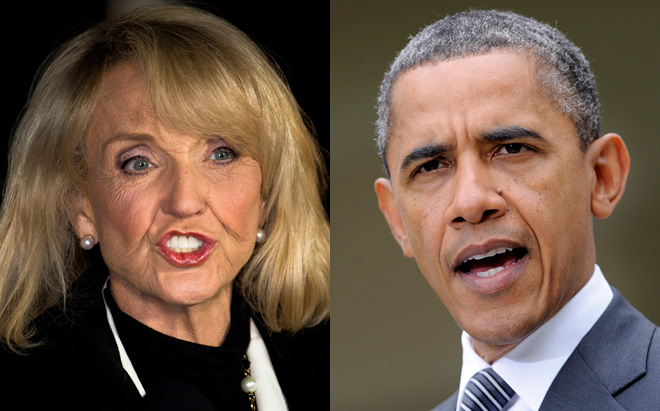The Supreme Court on Monday struck down key parts of Arizona’s immigration law, but let stand one controversial provision — at least for now.
In a 5-3 ruling handed down by Justice Anthony Kennedy, the high court held that most of the provisions being challenged encroached on turf that is constitutionally reserved for the federal government. The court overturned parts of the law that criminalize one’s presence in Arizona without documentation, criminalize working or looking for work without legal status, and permit police to arrest people without a warrant if there’s suspicion that they’ve committed a deportable crime.
But the provision of S.B.1070 permitting police to check a person’s immigration papers during lawful detainments was not thrown out by the court. Rather, the court declared that it was premature for the lower courts to block that provision of the law and left open the possibility of revisiting its constitutionality after it goes into effect.
“The Government of the United States has broad, unÂdoubted power over the subject of immigration and the status of aliens,” Justice Kennedy wrote in the majority opinion, which was joined by Chief Justice John Roberts and Justices Ruth Bader Ginsburg, Stephen Breyer and Sonia Sotomayor. Justice Elena Kagan, who worked on the issue as Obama’s solicitor general, did not participate in the case.
Arizona argued that the law cooperatively assists the U.S. with immigration enforcement, but the court mostly agreed with the Obama administration that key parts of the law encroach on the federal government’s exclusive right to make policy on the matter.
Justice Antonin Scalia emphatically came to Arizona’s defense in his dissenting opinion.
“Today’s opinion, apÂproving virtually all of the Ninth Circuit’s injunction against enforcement of the four challenged provisions of Arizona’s law, deprives States of what most would consider the defining characteristic of sovereignty: the power to exclude from the sovereign’s territory people who have no right to be there,” Scalia wrote. “Neither the Constitution itself nor even any law passed by Congress supports this result.”
Overall, the decision is an election-year victory for President Obama, who led the challenge.
The ruling is a blow for Republican Gov. Jan Brewer and serves as a warning shot to other state legislatures supportive of similar measures. It could help energize conservatives, who are strongly supportive of the law. Brewer’s initial reaction focused on the fact that the papers-checking provision wasn’t struck down.
“After more than two years of legal challenges, the heart of SB 1070 can now be implemented in accordance with the U.S. Constitution,” she said, warning supporters of the law that legal challenges “will continue.”
On the other hand, the decision could help Democrats galvanize Hispanics, who would be disproportionately targeted by the law and broadly oppose it.
“With three out of the four provisions being struck down, the ruling shows that the Obama administration was right to challenge this law, which was not just ill-advised but also unconstitutional,” said Senate Majority Leader Harry Reid (D-NV). “Looking ahead to the immigration debate, it is disturbing that Mitt Romney called the unconstitutional Arizona law a ‘model’ for immigration reform.”
Read the Supreme Court’s decision on S.B. 1070:






